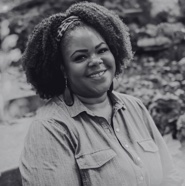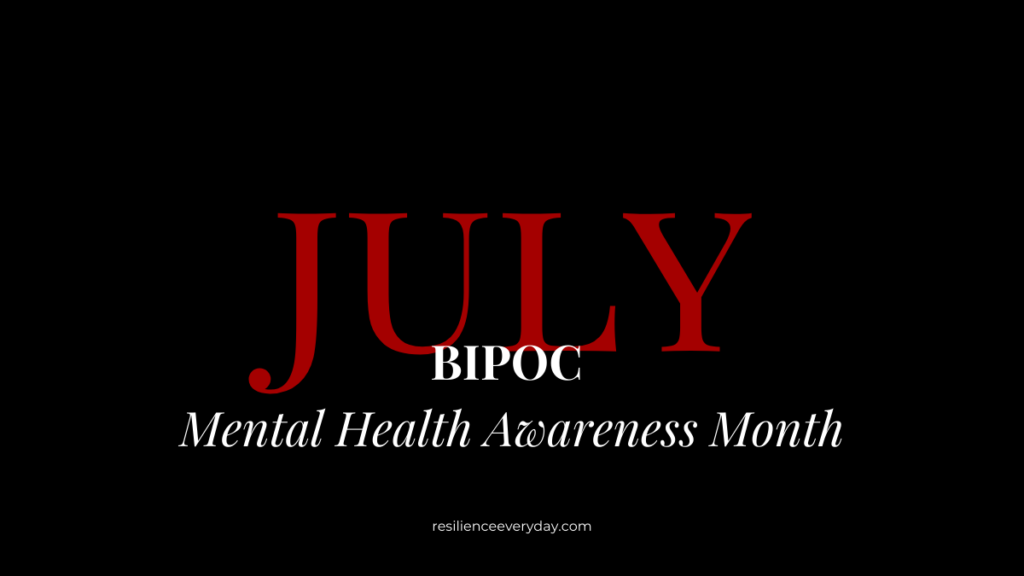
choose a resilient mindset and lifestyle…everyday.

Formally known as Bebe Moore Campbell National Minority Mental Health Awareness Month, July is BIPOC (black, indigenous, and people of color) Mental Health Awareness Month.
I’d like to share a bit of history, tell you why it matters, and give tips on how you too can get involved in this important cause.
The Origin of BIPOC Mental Health Awareness Month
July became formally recognized by Congress as Bebe Moore Campbell National Minority Mental Health Awareness Month on June 2, 2008.
Bebe Moore Campbell was an author and activist who used her voice to bring awareness to the challenges faced by Black women, Black people living with mental illness, caregivers of those with mental illness, as well as other people of color. She was also the mother of a child with a mental illness, and it was this child who inspired her to fight for mental health equity for all.
Bebe Moore Campbell passed away in 2006, but her legacy lives on through the efforts of mental health advocates who have gladly picked up the torch.
What BIPOC Mental Health Awareness Means to Me
I was diagnosed with bipolar disorder in my late 20s. At that time, I worked for a non-profit organization whose mission was to advocate for neurodivergent or otherwise disabled children and young adults to ensure they received education and care tailored to their unique needs. This was done in a number of ways including accompanying the parents of these children to school meetings regarding their Individualized Education Plans (IEPs) and connecting with government officials at every level to see laws passed in favor of neurodivergent individuals.
Employed within this organization were individuals who had lived experience with neurodivergence or other disabilities or were educated in the area of neurodivergence, social work, or early childhood and secondary education.
This should have been a safe place for me to disclose my diagnosis. After all, we represented several children and teens with bipolar disorder, depression, and anxiety. But, as a young Black woman in an office full of older white women, I learned that it was not a safe place at all. Unfortunately, I did not learn this until after I had disclosed it.
I would watch as they rallied around a white co-worker who battled depression and anxiety while I was being told to “suck it up and do your job.” Attempting to speak up for myself was always met with accusations of me having an attitude problem which Black women are often accused of when trying to advocate for themselves.
It became clear that it was “me against them” and that I had no voice there.
Why BIPOC Mental Health Awareness Month Should Matter to All
“While everyone – all colors – everyone is affected by stigma – no one wants to say ‘I’m not in control of my mind.’ No one wants to say ‘The person I love is not in control of [their] mind.’ But people of color really don’t want to say it because we already feel stigmatized by virtue of skin color or eye shape or accent and we don’t want any more reasons for anyone to say, ‘You’re not good enough.'”
Bebe Moore Campbell
BIPOC Mental Health Awareness Month matters because it shines a light on the unique mental health challenges faced by people of color. It also recognizes the resilience and tenacity of these various cultures fighting to have their voices heard.
You can easily google the statistics and find several studies that show how Black, indigenous, and other people of color are significantly more likely to receive inadequate mental health treatment—if they receive any care at all. This is due to things like shame and embarrassment, poverty and insufficient access to medical care, cultural ignorance, and, yes, blatant racism to name a few.
Raising awareness about the mental health needs and disparities in BIPOC communities helps people know that they are not alone and that there is help available to them. It also helps the white counterparts who are willing to listen begin to understand why struggles faced by BIPOC communities are considered unique and not necessarily like their own.
I know I’m not alone in my own experience of feeling pushed aside due to my diagnosis and the color of my skin. This is why BIPOC Mental Health Awareness Month matters. This is why it should matter to all.
Ways to Get Involved in BIPOC Mental Health Awareness Month
Whether you’re an individual living with mental illness or someone whose life has been impacted by mental illness in another way, you can get involved in the effort to spread awareness about the unique challenges faced by BIPOC communities as well
as support their resilience in spite of those challenges in a number of ways. Here are some suggestions.
Get the Mental Health America BIPOC Mental Health Month Toolkit
Every year for BIPOC Mental Health Awareness Month, Mental Health America (MHA) helps spread the word by offering a themed toolkit for mental health practitioners and individuals interested in educating themselves and/or others about this important issue. This year’s theme is #BeyondTheNumbers, going beyond statistics and highlighting the cultural richness of BIPOC communities.
The 29-page toolkit contains the historical contexts, barriers to well-being, cultural beliefs, and strength and resiliency factors of the following BIPOC communities:
- American Indian/Alaska Native
- Arab/Middle Eastern/Muslim/South Asian
- Asian/Pacific
- Black/African American
- Latinx/Hispanic
- Multiracial
The toolkit also contains shareable social media graphics, as well as tips and worksheets to help individuals with talking to their loved ones about mental health and choosing the best mental health care provider for them.
Visit MHA’s website to signup for your free toolkit here.
Share the BIPOC Mental Health Resource List
The BIPOC Mental Health Resource List is a six-page pdf chock full of general mental health resources (webpages, webinars, infographics, etc.) from MHA. It also contains culturally specific resources for each of the BIPOC communities previously mentioned.
Download yours here.
How’s Your Own Mental Well-Being?
Check on your mental well-being from the privacy of your own home. Take one of MHA’s quick online screening tests.
The screenings take just a few minutes, and when you’re done, MHA gives you your result with tips for finding support that works for you, if applicable.
Get started here.
Share Your Story to Encourage Others
Perhaps you’re like me: someone who has lived experience with a chronic mental illness, doing the work to live in spite of that illness. Maybe also like me, you want to inspire others with similar stories to shed the shame and come out of hiding.
In my book Resilient: Finding the Will to Get Back Up Again, I encourage readers to “make their pain work for their good and the good of others.” Living with bipolar disorder, depression, and anxiety can be excruciatingly painful at times. But, I find joy in sharing my story, letting others know they’re not alone. I also encourage others to cultivate a resilient mindset and lifestyle so they can thrive personally and professionally in spite of mental illness.
A Quick Word About Shame
Of course, you don’t have to share your story. This is merely a suggestion, after all. But, if your reason for not wanting to share your story is because you’re ashamed, let me encourage you.
No one, and I mean no one, can use your truth against you when you own it. And anyone that would try should not be allowed into your space!
I have met a number of women (and some men) who have told me that they were encouraged by something I’d written or shared about my journey. This brings me joy and great solace when I need it. I refuse to be silenced by shame.
Again, you don’t have to share your story if you don’t want to. But, please don’t let shame be the reason. There is nothing to be ashamed of.
Educate Yourself
Research various mental health conditions, courses of treatment, and the best ways to interact with or help someone who is having a mental health crisis or other challenges.
Listen Without Judgment
If you know someone living with mental health challenges, take the time to listen to them with empathy and without judgment. Sit with them as they sit with their feelings and just be.
Contact Your Congressman/Congresswoman
Finally, you can send letters to Congress, asking them to vote in favor of The Pursuing Equity Act, the Mental Health for Students Act, and the STANDUP Act.
Is there anything you would add to this list? Do you have lived experience with mental illness? Is there someone close to you who lives with a mental illness? How have you been a bright light to them?
Feel free to share your story in the comments. I am listening.
View Comments
Leave a comment